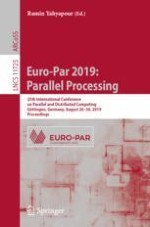2019 | OriginalPaper | Buchkapitel
Scalable FIFO Channels for Programming via Communicating Sequential Processes
verfasst von : Nikita Koval, Dan Alistarh, Roman Elizarov
Erschienen in: Euro-Par 2019: Parallel Processing
Aktivieren Sie unsere intelligente Suche, um passende Fachinhalte oder Patente zu finden.
Wählen Sie Textabschnitte aus um mit Künstlicher Intelligenz passenden Patente zu finden. powered by
Markieren Sie Textabschnitte, um KI-gestützt weitere passende Inhalte zu finden. powered by
Abstract
select expression. Despite their growing popularity, most known implementations of channels use lock-based data structures and can be rather inefficient.